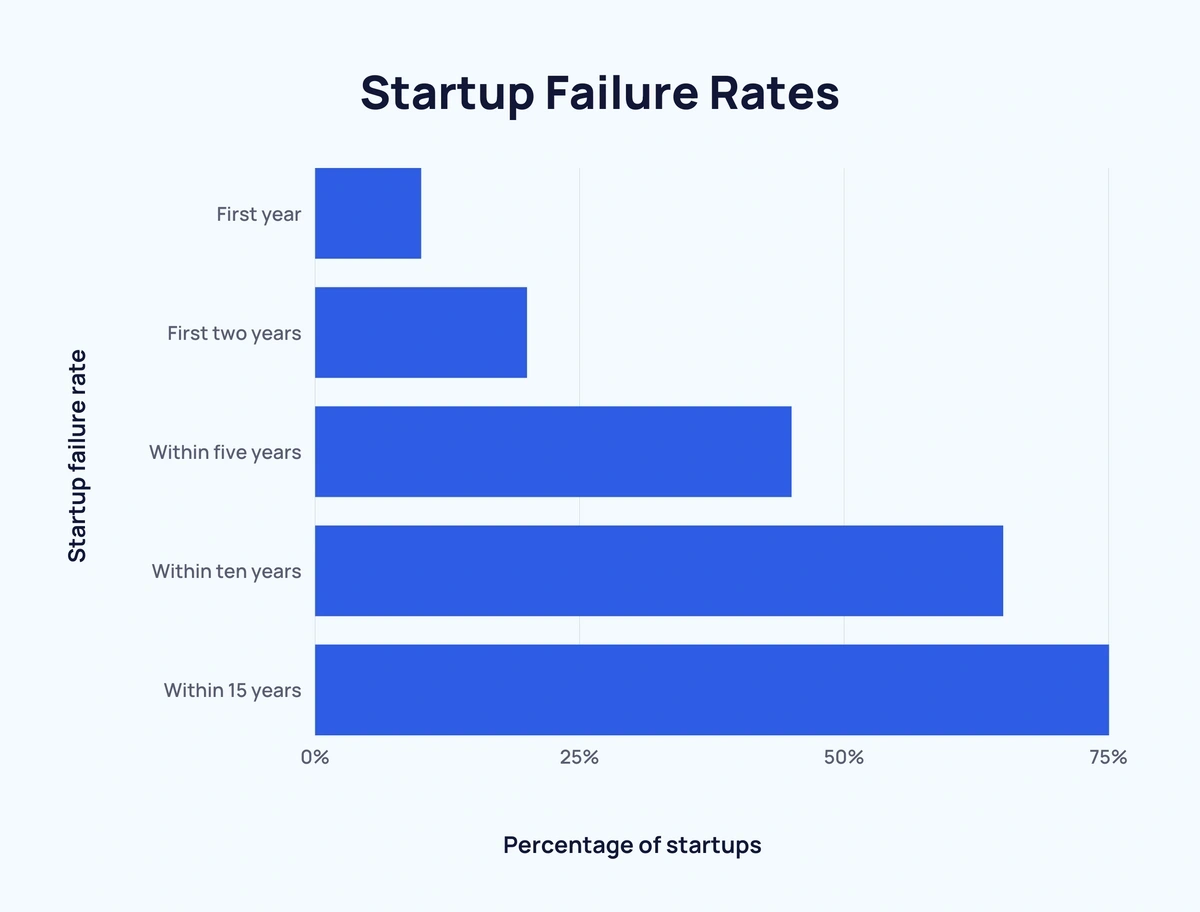Understanding Food Startup Failure: A Founder's Perspective

Table of Contents
Lack of a Solid Business Plan and Market Research
Many food startups stumble before they even leave the gate due to a lack of thorough planning and market research. This oversight frequently leads to the creation of products or services that simply don't resonate with the target audience, resulting in startup failure.
Underestimating Market Demand
Launching a food business without deep market research is akin to sailing without a map. A significant percentage of food startup failures can be attributed to this crucial oversight.
- Insufficient market research on target demographics: Failing to define your ideal customer leads to a scattershot approach, wasting resources and failing to connect with the right consumers.
- Ignoring competitor analysis and their market share: Understanding your competition is vital. Knowing their strengths, weaknesses, and market penetration helps inform your own strategy and identify opportunities.
- Failing to validate the product/service concept before significant investment: Testing your product or service concept with potential customers before investing heavily is crucial to avoid costly mistakes. Gather feedback and adapt your offering accordingly.
- Lack of understanding of pricing strategies and consumer purchasing power: Pricing your products competitively yet profitably requires careful consideration of your target market's spending habits and the pricing of similar offerings.
Poor Financial Planning and Management
Even the most innovative food concept will falter without sound financial management. This encompasses inadequate cash flow projections, unrealistic budgeting, and insufficient funding. Poor financial planning is a major contributor to food industry failure.
- Insufficient startup capital: Underestimating the initial investment needed to launch and sustain a food business is a common mistake. Secure adequate funding to cover expenses during the crucial initial stages.
- Poor budgeting and expense control: Track every expense meticulously. Develop a realistic budget and stick to it. Uncontrolled spending can quickly deplete resources.
- Lack of understanding of food cost calculations and profit margins: Accurate food cost calculations are crucial for setting profitable prices. Understanding profit margins is essential for sustainable growth.
- Ignoring the importance of a comprehensive financial model: A well-structured financial model, including projected income statements, cash flow projections, and balance sheets, is essential for securing funding and making informed business decisions.
Operational Inefficiencies and Supply Chain Issues
The food industry hinges on smooth and efficient operations. Bottlenecks, poor production planning, and supply chain disruptions can quickly cripple profitability and lead to culinary business failure.
Inefficient Production Processes
Streamlined processes are critical in food businesses. Inefficiencies lead to delays, increased costs, and ultimately, dissatisfied customers.
- Lack of streamlined processes for food preparation and service: Optimize your workflows to maximize efficiency in food preparation, cooking, and service.
- Poor inventory management leading to waste and spoilage: Implement a robust inventory management system to minimize food waste and spoilage, preserving both quality and profitability.
- Inadequate staffing and training: Ensure you have the right staff with the necessary skills and training to deliver quality service efficiently.
- Lack of scalability in production capacity: Plan for growth. Your production processes must be scalable to meet increasing demand without compromising quality.
Unreliable Supply Chains
Relying on unreliable suppliers can be catastrophic for a food startup. Ingredient shortages, delivery delays, and quality inconsistencies can disrupt operations and damage your reputation, contributing to restaurant failure.
- Dependence on single suppliers without backup options: Diversify your suppliers to mitigate the risk of disruptions.
- Poor negotiation of contracts with suppliers: Secure favorable terms and conditions with your suppliers to protect your business interests.
- Lack of quality control in sourced ingredients: Implement stringent quality control measures to ensure the consistent quality of your ingredients.
- Failure to establish a resilient supply chain strategy: Develop a comprehensive supply chain strategy that considers potential risks and disruptions.
Ignoring Marketing and Branding
Having a great product isn't enough; customers need to know it exists. A weak brand identity and insufficient marketing efforts are common reasons for food startup failure.
Weak Brand Identity and Messaging
A compelling brand story and consistent messaging are fundamental to attracting and retaining customers. A weak brand identity can lead to a struggle to stand out in a competitive market.
- Lack of a clear brand identity and unique selling proposition (USP): Define what makes your business unique and communicate it effectively to your target audience.
- Poor marketing strategy and lack of online presence: Develop a comprehensive marketing strategy with a strong online presence to reach your target customers.
- Ineffective communication with target customers: Understand your customers' needs and communicate your brand's value proposition effectively.
- Failure to build brand loyalty: Focus on building relationships with your customers to cultivate brand loyalty and repeat business.
Insufficient Marketing Efforts
Ignoring marketing is a recipe for failure. Even the best product will remain undiscovered without a robust marketing strategy.
- Inadequate budget allocation for marketing and advertising: Allocate sufficient funds for marketing and advertising to reach your target audience effectively.
- Lack of a targeted marketing strategy across various channels: Employ a multi-channel marketing approach to reach your target audience where they are.
- Insufficient use of social media and online marketing: Leverage the power of social media and online marketing to connect with your target audience.
- Failure to gather customer feedback and use it to improve marketing efforts: Continuously gather customer feedback to refine your marketing efforts and ensure they are resonating with your target audience.
Conclusion
Understanding the reasons behind food startup failure is paramount for success. By carefully analyzing these key areas – market research, financial planning, efficient operations, and effective marketing – aspiring food entrepreneurs can substantially increase their chances of establishing a thriving and sustainable business. Remember, a robust business plan, combined with a deep understanding of your target market and a resilient operational strategy, lays the foundation for a successful food startup. Don't let your culinary dreams fade – learn from the mistakes of others and build your food business strategically, avoiding common pitfalls that lead to food startup failure. Start planning your food business today with thorough research and a detailed business plan; your culinary success awaits!

Featured Posts
-
 15 Year Wait Over Whats App Launches On I Pad
May 29, 2025
15 Year Wait Over Whats App Launches On I Pad
May 29, 2025 -
 Harvards Federal Contracts In Jeopardy Under Trump Administration
May 29, 2025
Harvards Federal Contracts In Jeopardy Under Trump Administration
May 29, 2025 -
 Tim Meyer Replaced Meyer Turku Announces New Ceo From Cargotec
May 29, 2025
Tim Meyer Replaced Meyer Turku Announces New Ceo From Cargotec
May 29, 2025 -
 Vitoria De Musk Space X Instala Base Em Nova Cidade Do Texas
May 29, 2025
Vitoria De Musk Space X Instala Base Em Nova Cidade Do Texas
May 29, 2025 -
 Mkhatr Alensryt Almqnet Tathyrha Ela Alafrad Walmjtme
May 29, 2025
Mkhatr Alensryt Almqnet Tathyrha Ela Alafrad Walmjtme
May 29, 2025
